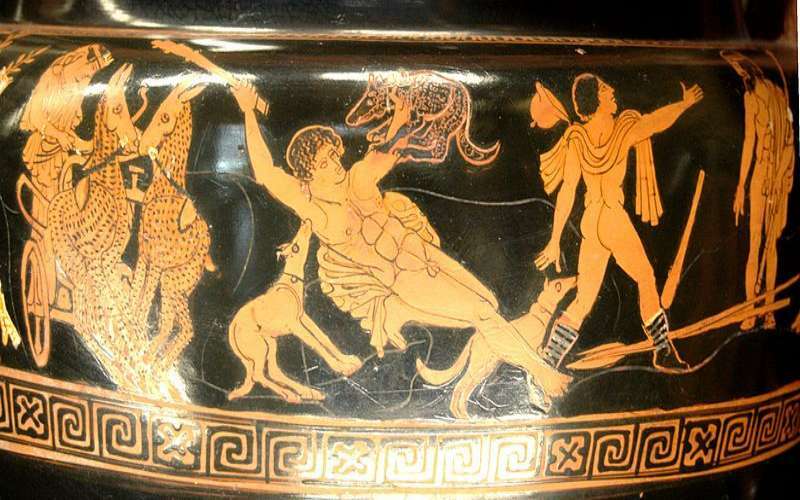In Greek mythology, Artemis (also known as the Roman goddess Diana) was the daughter of Zeus, the mighty ruler of the Olympian gods. Her mother, Leto, gave birth to Artemis after a short and painless labor.
However, Leto’s labor continued, with her contractions growing weak and painful. Moved to compassion, the infant goddess Artemis, born only a few minutes earlier, became her mother’s midwife and delivered her twin brother Apollo.
You could say that, of all the Greek goddesses, she was literally born to serve as a nurturer and protector!
Protecting The Weak
Artemis was frequently called upon to nurture her needy and somewhat ineffectual mother. She often felt compelled to come to her rescue even though she received little from her mother in return.
As a result of her having caused her mother no pain in childbirth and her successful role as midwife in her brother’s birth, she naturally became the patron saint of childbirth, the protector of children, and the goddess who especially heard the appeals of women.
The goddess Artemis was always responsive to the needs of the vulnerable and the suffering. She was quick to defend the powerless from unjust treatment at the hands of the Olympian patriarchy; it is not surprising that in current times she is seen as the “feminist” goddess.
Six Wishes
Even as a small child, Artemis was decisive. When Zeus asked Artemis what presents she wanted for her third birthday, she responded without hesitation that she wanted six things:
- To be allowed to live without having to be distracted by love and marriage
- A bow and arrow just like her brother’s
- A hunting costume and freedom from having to dress up like a lady
- The job of bringing light into the world
- Sixty young nymphs to be her companions and to help care for her hunting dogs
- All the mountains on the earth to live on
Zeus was amused by her precociousness and happily granted the little goddess her wishes. Even at this tender age, it was clear that Artemis would be the most independent of the goddesses, one who thrived on challenges!
Artemis’ Connection With Nature

Artemis’ association with the natural world and the wilderness symbolizes her own untamed spirit. The most independent of the goddesses, she roamed the forests in her role as a huntress.
The Greek goddess Artemis was famous for her hunting skills, the sharp focus of her attention, and her unerring aim. She was known as a fearless and responsible hunter, willing and able to bring down the most terrifying beasts.
She was especially fierce in her protection of the gentle animals that were usually preyed upon. As the protector of animals and the young, the goddess Artemis was angered because a group of Greek sailors had slaughtered a hare and its young. She delayed them from sailing to join the Battle of Troy.
The Relationship With Mankind
Artemis was not the least interested in cultivating the land or in harnessing the forces of nature to benefit mankind (she left those responsibilities to Demeter and Athena, respectfully). She could easily be described as an early environmentalist.
Artemis seemed to be more comfortable with the companionship of women friends. Often depicted by artists while hunting or bathing with her band of nymphs, the goddess valued her freedom and personal space and protected them with ferociousness.
Indeed, those who restricted her freedom, those who tried to thwart her commitment to reaching her goals, or simply invaded her privacy, paid dearly. When the hunter Actaeon accidentally came upon Artemis while she was bathing, she turned him into a stag, whereupon his own hunting dogs attacked and tore him to pieces.
The Relationship With Other Deities
Artemis could be both vengeful and impulsive. When she discovered that Callisto, one of the nymphs in her band of companions, had violated her vows of chastity and become pregnant as a result of an affair with Zeus, Artemis changed her into a bear without a moment’s hesitation. Had Zeus not intervened to place her in the stars as the constellation Callisto (The Bear), the young nymph would have died quickly as the victim of a hunt.
A Tragic Love Story
With the exception of her brother Apollo, who was a frequent ally and companion, Artemis was not known to have had very satisfying relationships with men. Her one great love affair, with the handsome and respected mortal Orion, ended very badly.
Upset that his sister’s time and attention had been diverted away from him, the jealous Apollo tricked Artemis into killing Orion. Knowing that Orion was swimming in the ocean, Apollo bet Artemis that she could not hit “that distant object on the horizon” with an arrow.
Filled with confidence in her skills as an archer, she accepted the challenge. Successful as always, Artemis discovered that her competitiveness and unerring aim had killed the only man she had ever loved.
In her abject grief, she turned her dead lover into stars and shot him into the night sky, where he remains as the constellation Orion. Never again did she allow herself to become vulnerable to romantic love.
The Goddess Of Moon And Light
The Greek goddess Artemis was often associated with the moon, especially the crescent or “new” moon. Phoebe was one of the many names she was called. The name Phoebe means the “light one” or “bright one.”
As the “Goddess of Light,” she had the divine duty of illuminating the darkness. She was often depicted carrying a candle or torch, lighting the way for others, and leading them through uncharted territories.
Legacy
In Greek mythology, Artemis, despite her refusal to conform to conventional ways or tradition and her fierce independence, was depicted as one of the compassionate, healing goddesses. Of all the Greek goddesses, she was the most self-sufficient. She lived life on her own terms, and was comfortable both in solitude and in holding the reins of leadership.
Above all else Artemis gives us courage. Like her counterpart, the Roman goddess Diana, she illuminates those places that terrify us. Lending us her strength to bring us safely through our fears.
Artemis Symbols
Artemis, also known as the Roman goddess Diana, is often represented by the new moon and symbols associated with her fierce, adventurous, yet distinctly feminine nature.
It is hardly surprising that many of our icons representing feminine strength and the passionate embrace of causes are derived from the ancient goddess symbols of Artemis.
General
The crescent moon (new moon) is one of Artemis’ symbols, as she was not only the goddess of hunting but also the goddess of light and moon. Her other name was “Phoebe,” which means “the light one.”
Artemis’ other symbols include a bow and arrow, sandals, clouds, three pillars, and a blue sky.
Animals
Dogs have been used for hunting since they were first tamed. It makes no wonder that these animals symbolize Artemis as a goddess of hunting.
Other animals symbolizing Artemis are guinea fowl, elephant, horse, bear, dove, deer, and bees.
Plants
Anemones symbolize losing a loved one in a tragedy, and unfortunately, such was the case with Artemis. She was in love with Orion, a mortal man that was accidentally killed by her.
Other plant symbols of Artemis are flowering almonds, hazel, ranunculus, honeysuckle, thistle, laurel, and fir tree.
Perfumes/Scents
Jasmine’s scent symbolizes modesty and purity, traits that are associated with Artemis. This scent also symbolizes love and passion, something Artemis wasn’t known for. Still, she loved once, with all her heart and passion, but it ended tragically.
Other perfumes and scents symbolizing Artemis are aloes, ginseng, lemon verbena, and camphor.
Gems and Metals
Moonstone is the most common gem symbol of Artemis, as she was the goddess of the moon and light. Other gems and metals that can symbolize Artemis are pearl, quartz, crystal, silver, turquoise, iron, aluminum, and diamond.
Goddess Jewelry
There are many reasons why you might want to keep a healing crystal or stone close to you. Getting closer to your goddess by wearing her color or crystal is a great one. That they also look great as jewelry only makes it so much better!
Here is a guide to crystal jewelry you hopefully will find helpful. In it is a list of 30+ crystals and links to some really great looking jewelry with that crystal or stone. Enjoy!
Colors
Silver is the color often associated with moon, and by association, with Artemis. Her other colors are white, red, green, and turquoise.
Embracing the Call of Artemis: Recognizing Her Presence and Cultivating a Sacred Connection

Have you ever felt a deep connection with nature and its inhabitants and wondered if it’s more than just coincidence? For many spiritual seekers, the goddess Artemis may be extending an invitation to connect. Explore how to recognize the signs of her calling, invoke her presence, and cultivate a meaningful relationship with this powerful Greek goddess.
How to know if Artemis is calling you?
One way to recognize Artemis’ call is through nature. Encounters with deer, forest creatures, or feelings of serenity in natural settings may be signs. Keep an eye out for any animals that seem drawn to you, as Artemis often communicates through her beloved creatures.
Dreams and visions are another way Artemis may reach out. Dreams featuring her or her symbols, like the crescent moon or hunting imagery, can be significant. Similarly, visions of moonlight or silver light might signal her presence.
Finally, pay attention to synchronicities in your life. Repeated encounters with her symbols, or a strong attraction to her stories and mythology, can indicate that Artemis is calling you. These patterns may seem coincidental, but they’re worth noting.
Invoking Artemis
To call upon Artemis, start by selecting a natural location or creating an indoor space inspired by nature. Incorporate her symbols, such as the crescent moon, bow and arrow, or images of her into your chosen area. This will help establish a connection with the goddess.
During your ritual, light candles, particularly silver or white, as they represent the moon and her purity. Offer symbols of Artemis, such as flowers, tokens, or even written intentions. These offerings demonstrate your dedication and respect for her.
In meditation, focus on your breath and clear your mind. Visualize Artemis, her symbols, and the energy she embodies. Quietly ask for her guidance, and be open to any insights that may arise during your meditation.
Signs that Artemis is present
Recognizing when Artemis is with you is essential to deepening your connection with her. The goddess often manifests her presence in various ways, from emotional sensations to visual cues. Here are six signs to help you identify when Artemis is near:
- Emotional sensations: Feelings of calm, protection, or empowerment can indicate her presence.
- Physical reactions: Sudden chills, tingling sensations, or goosebumps may signal she’s near.
- Visual cues: Flashes of silver light, shadows moving, or glimpses of her symbols can be signs.
- Auditory cues: Hearing whispers, rustling leaves, or animal sounds may suggest her presence.
- Nature occurrences: Unusual animal encounters, especially with deer or forest creatures, can be a signal.
- Intuitive connection: A strong sense that Artemis is with you, even if you can’t pinpoint why, can be a sign of her presence.
Cultivating a relationship with Artemis
To build a deeper connection with Artemis, establish a consistent practice of meditation, prayer, or ritual to honor her. Make regular offerings, such as during the full moon, to demonstrate your commitment to the goddess.
Embrace her values by fostering independence and self-sufficiency in your life. Protect and nurture nature and wildlife, as these aspects are central to her being. Aligning your life with her principles will help deepen your connection to her.
Lastly, study her mythology and history. Read about Artemis and her place in Greek mythology, and engage with others who share your interest. By exchanging insights and experiences, you’ll develop a richer understanding of the goddess and strengthen your bond with her.
Artemis’ Meditations
If you want to honor and strengthen your Goddess Type, or you want to recognize your missing Goddes Type, try these meditations to invoke Artemis:
- I call on you, Artemis, to help me realize that my goals are attainable and that I can realize my visions
- Great goddess, help me fulfill my promise by developing my natural talents.
- Artemis, help me give full attention to the moment I am in so that I do not miss valuable opportunities that come my way.
- Great goddess, help me to release my need to please others if it means sacrificing my own ideals.
- Artemis, as the goddess of adventure, help me to take charge and meet challenges head-on and with courage.
- Remind me, Artemis, to appreciate the other women in my life and the companionship and courage that they give me.
- Today, Artemis, I will tune into my body and move with your grace and physical vitality.
- Artemis, remind me today that, like you, I need not be vulnerable to the influences and manipulations of others.
- Artemis, show me how to release the limits I impose on myself and to get all the enjoyment and success that I can out of life.
- Artemis, I join you in enjoying the pleasure of speaking my mind, even when others oppose me.
- Artemis, lend me your ability to display competence without being arrogant or inconsiderate.
- Goddess, like you, I accept responsibility for my happiness and for meeting my needs.
- Artemis, teach me to see new situations as welcome challenges that I can manage with success.
Other Goddesses
If you enjoyed this post we are sure you will enjoy getting to know some of the other goddesses we also write about. You can find the complete list of goddesses sorted across regions and religions here.
Featured Image Credit: Louvre Museum, Public domain, via Wikimedia Commons


